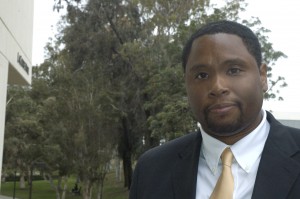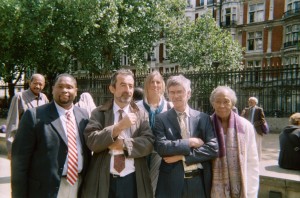Salim Faraji, assistant professor of Africana studies at California State University, Dominguez Hills, attended the 12th Annual International Conference for Nubian Studies in August at the British Museum and presented his findings on “Africana Nubiology: Examining Classical Sudanese Traditions in West Africa.”

“Ancient Sudanic civilization extended as far as West Africa,” says Faraji. “You can still see some of these cultural traditions in West Africa today. One is the building of sacred mounds on the palaces of royalty. I’ve seen these mounds in northern Ghana and other traditions that I can pinpoint as emerging in both ancient Nubia and West Africa.”
As one of only two Nubiologists on the West Coast – the other being Dr. Stuart Tyson Smith at the University of California, Santa Barbara – Faraji says that although Nubia has traditionally taken a back seat to ancient Egypt in terms of mainstream academic interest in the United States, more grassroots scholarship on ancient Nubia among African American intellectuals and historians has taken place beginning in the early 20th century.
“In African American popular culture, there is the idea that Nubia is the ancient, pristine land and the original home of African people,” says Faraji. “Nubia was [a study] that emerged through historians like William Leo Hansberry, a pioneer in African and African American history. He was the first to teach African civilizations and African history courses here in the United States in the 1920s and 1930s before African civilizations was even a topic of study.”

Faraji says that Nubia shares a place with ancient Egypt as “a classical African civilization.”
“It is to the rest of Africa, what Greece and Rome were to the rest of Europe,” he points out. “It was a contemporary society [alongside] Egypt, one that influenced Egypt and was also influenced by Egypt. In terms of Pharaonic civilization, it is older than Egypt and lasted longer than Egypt. It is because of [these facts] that Nubia has become more of a focal point.”
Faraji says that he is grateful for the support that enabled him to attend the conference from the department of Africana studies and of his church, Christ Our Redeemer African Methodist Episcopal Church in Irvine, where he serves on the ministerial staff. He says that his work with the church enhances his ability to have “more sensitivity and compassion for the human needs of [my] students.” He also says that the highlight of his time at the conference was meeting leading Nubian scholars from around the world and networking with what is still an exclusive community of expertise. He hopes those connections benefit his students in the future.
“The connections that I made at this conference are just incredible,” says Faraji. “One of the things I want to do in the future is take students to the Sudan and to southern Egypt for study tours as well as to participate in archaeological excavations. I made that much closer to being a reality by meeting all of these key people. It is an awesome opportunity for students here at CSU Dominguez Hills for me to have access to these types of resources and relationships.”
Faraji is currently at work on a book titled, “The Last Pharaoh: Roots of Nubian Christianity Uncovered; Religion and Cultural Encounter in Late Antique Africa,” which focuses on the cultural transformation that occurred with the conversion of ancient Nubia to Christianity between the 4th and 6th century AD and the establishment of three medieval kingdoms that lasted from approximately the fifth century AD until the 1500s.
For more information on Africana studies at CSU Dominguez Hills, click here.